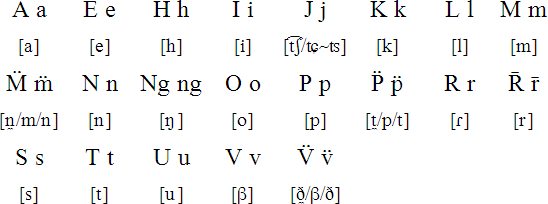Araki is a member of the Southern Oceanic branch of the Malayo-Polynesian language family. It is spoken on Araki island south of Espiritu Santo island in Vanuatu by about 8 people. The rest of Araki's population understand the language and speak it to a limited extent. There is a language shift going on towards Tangoa, and Araki speakers also speak Bislama.

Download an Araki alphabet chart (Excel)
R̄uai, Raki mo roho r̄o v̈ahasun Okava. Mo re lo ran mo hese, mo v̈eia hanhan mo hese Raki. Mara Naur̄alap̈a mo sivosivo mo velu r̄o kia. Mo velu, rai nohosu mo r̄oho r̄o. Naurālap̈a mo rongo leoro r̄o.
Before, Araki was situated over there, in (front of) Hog Harbour. One day there was a big feast in Araki, so they say. The people from Santo went there to dance. As they were dancing, those who were on the mainland (Santo) could hear their voices.
Source: http://alex.francois.free.fr/data/AlexFrancois_Storian-Araki_2011.pdf
Araki sample text provided by Michael Peter Füstumum
Information about Araki | Araki Numbers
Information about the Araki languages
https://en.wikipedia.org/wiki/Araki_language
https://fr.wikipedia.org/wiki/Araki_(langue)
https://www.ethnologue.com/language/akr
http://alex.francois.free.fr/AF-Araki.htm
Adzera, Ahamb, Äiwoo, Aneityum, Apma, Araki, Are, ’Auhelawa, Avava, Babatana, Bariai, Bola, Big Numbas, Buhutu, Bwaidoka, Caac, Cheke Holo, Dorig, Hiri Motu, Hiw, Hoava, Kakabai, Kaninuwa, Kokota, Kove, Kurti, Lakon, Lehali, Lenakel, Lewo, Lote, Lo-Toga, Löyöp, Manam, Marovo, Maskelynes, Mato, Mavea, Mono-Alu, Motu, Mussau-Emira, Mwotlap, Nafsan, Nahavaq, Namakura, Nanggu, Nduke, Neve‘ei, Neverver, Ninde, North Efate, Nume, Paamese, Papapana, Raga, Rotuman, Roviana, Sa, Sakao, Saliba, Siar, Sio, Ske, Sobei, Sursurunga, Tamambo, Tami, Teanu, Tigak, Tirax, Tolai, Touo, Ubir, Ughele, Uneapa, Vatlongos, Vitu, Vurës, Western Fijian, Yabem, Yapese
Languages written with the Latin alphabet
Page last modified: 24.02.23
[top]
You can support this site by Buying Me A Coffee, and if you like what you see on this page, you can use the buttons below to share it with people you know.

If you like this site and find it useful, you can support it by making a donation via PayPal or Patreon, or by contributing in other ways. Omniglot is how I make my living.
Note: all links on this site to Amazon.com, Amazon.co.uk
and Amazon.fr
are affiliate links. This means I earn a commission if you click on any of them and buy something. So by clicking on these links you can help to support this site.
[top]